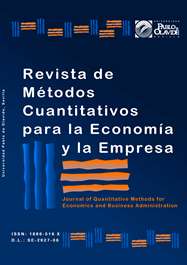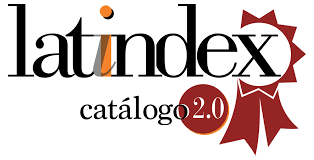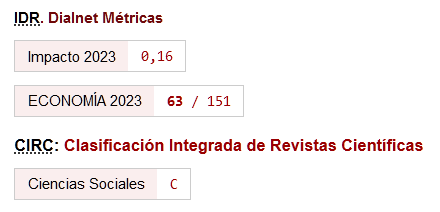Dividendo entre reputación y persistencia de ganancias
DOI:
https://doi.org/10.46661/rev.metodoscuant.econ.empresa.7331Palabras clave:
dividendos, reputación, persistencia ganancias, predictibilidad gananciasResumen
¿Afectan la persistencia-predictibilidad de ganancias y la reputación, la política de dividendos? Éste estudio aporta elementos nuevos con el fin de enriquecer el debate en torno a la pregunta en cuestión. Para ello se estructura un panel de datos de empresas listadas en América Latina con información financiera obtenida en la base de datos Datastream y un escalafón de reputación corporativa conocido como MERCO durante el período comprendido entre 2008 y 2016. Posteriormente se contrastan las hipótesis por medio de un estudio econométrico. Nuestro estudio econométrico se fundamenta en el modelo con que Lipe, R. (1990) estima el retorno de una acción a través de las propiedades de las series de tiempo de las ganancias, la tasa de interés utilizada para descontar las ganancias futuras esperadas, y la capacidad relativa de las ganancias en comparación con la información alternativa para predecir las ganancias futuras. Entre los principales hallazgos encontramos que la medida de persistencia aumenta la razón dividendos sobre activos, pero cuando se está en MERCO el resultado es negativo. Es como si las empresas se aprovecharan de aparecer en el ranking para pagar menos dividendos.
Descargas
Citas
Ali, A. & Zarowin, P. (1992) The role of earnings levels in annual earnings-returns studies. Journal of Accounting Research, 30(2), 286-296.
https://doi.org/10.2307/2491128
Bae, S. C. Chang, K., & Kang, E. (2012) Culture, corporate governance, and dividend policy: international evidence. Journal of Financial Research, 35(2), 289-316.
https://doi.org/10.1111/j.1475-6803.2012.01318.x
Ball, R. & Brown, P. (1968) An empirical evaluation of accounting income numbers. Journal of accounting research, 6(2), 159-178.
https://doi.org/10.2307/2490232
Boulstridge, E. & Carrigan, M. (2000) Do consumers really care about corporate responsibility? Highlighting the attitude-behaviour gap. Journal of communication management, 4(4), 355-368.
https://doi.org/10.1108/eb023532
Brockman, P. & Unlu, E. (2011) Earned/contributed capital, dividend policy, and disclosure quality: An international study. Journal of Banking & Finance, 35(7), 1610-1625.
https://doi.org/10.1016/j.jbankfin.2010.11.014
Bromley, D. (2002) Comparing corporate reputations: league tables, quotients, benchmarks, or case studies? Corporate reputation review, 5(1), 35-50.
https://doi.org/10.1057/palgrave.crr.1540163
Brown, P. & Kennelly, J. W. (1972) The informational content of quarterly earnings: An extension and some further evidence. The Journal of Business, 45(3), 403-415.
https://doi.org/10.1086/295469
DeAngelo, H., DeAngelo, L. & Skinner, D. J. (2004) Are dividends disappearing? Dividend concentration and the consolidation of earnings. Journal of financial economics, 72(3), 425-456.
https://doi.org/10.1016/S0304-405X(03)00186-7
Dechow, P. M., Sloan, R. G. & Sweeney, A. P. (1995). Detecting earnings management. Accounting review, 70(2), 193-225.
Dechow, P., Ge, W. & Schrand, C. (2010) Understanding earnings quality: A review of the proxies, their determinants and their consequences. Journal of accounting and economics, 50(2-3), 344-401.
https://doi.org/10.1016/j.jacceco.2010.09.001
Fama, E. F. & French, K. R. (2001) Disappearing dividends: changing firm characteristics or lower propensity to pay? Journal of Financial economics, 60(1), 3-43.
https://doi.org/10.1016/S0304-405X(01)00038-1
Fama, E. F. & French, K. R. (2002) Testing trade-off and pecking order predictions about dividends and debt. The review of financial studies, 15(1), 1-33.
https://doi.org/10.1093/rfs/15.1.1
Fombrun, C. J. (1995) Reputation: Realizing value from the corporate image. Harvard Business School Press.
Francis, J., LaFond, R., Olsson, P. & Schipper, K. (2005) The market pricing of accruals quality. Journal of accounting and economics, 39(2), 295-327.
https://doi.org/10.1016/j.jacceco.2004.06.003
Gaio, C. (2010) The relative importance of firm and country characteristics for earnings quality around the world. European accounting review, 19(4), 693-738.
https://doi.org/10.1080/09638180903384643
Gitman, L. J. & Zutter, D. C. (2011) Cash Flow and Financial Planning. Principles of Managerial Finance 13th Global Edition (pp.113). US: Pearson.
Grewal, D., Krishnan, R., Baker, J. & Borin, N. (1998) The effect of store name, brand name and price discounts on consumers' evaluations and purchase intentions. Journal of retailing, 74(3), 331-352.
https://doi.org/10.1016/S0022-4359(99)80099-2
He, W., Ng, L., Zaiats, N. & Zhang, B. (2017) Dividend policy and earnings management across countries. Journal of Corporate Finance, 42, 267-286.
https://doi.org/10.1016/j.jcorpfin.2016.11.014
Kothari, S. P., Leone, A. J. & Wasley, C. E. (2005) Performance matched discretionary accrual measures. Journal of accounting and economics, 39(1), 163-197.
https://doi.org/10.1016/j.jacceco.2004.11.002
Lafferty, B. A. & Goldsmith, R. E. (1999) Corporate credibility's role in consumers' attitudes and purchase intentions when a high versus a low credibility endorser is used in the ad. Journal of business research, 44(2), 109-116.
https://doi.org/10.1016/S0148-2963(98)00002-2
La Porta, R., Lopez‐de‐Silanes, F., Shleifer, A. & Vishny, R. W. (2000) Agency problems and dividend policies around the world. The journal of finance, 55(1), 1-33.
https://doi.org/10.1111/0022-1082.00199
Landon, S. & Smith, C. E. (1997) The use of quality and reputation indicators by consumers: the case of Bordeaux wine. Journal of Consumer Policy, 20(3), 289-323.
https://doi.org/10.1023/A:1006830218392
Leuz, C., Nanda, D. & Wysocki, P. (2003) Investor protection and earnings management: An international comparison. Journal of Financial Economics, 69(3), 505-527.
https://doi.org/10.1016/S0304-405X(03)00121-1
Lev, B. (1983) Some economic determinants of time-series properties of earnings. Journal of Accounting and Economics, 5, 31-48.
https://doi.org/10.1016/0165-4101(83)90004-6
Lipe, R. (1990) The relation between stock returns and accounting earnings given alternative information. Accounting Review, 65(1) 49-71.
Malkiel, B. G. & Fama, E. F. (1970) Efficient capital markets: A review of theory and empirical work. The journal of Finance, 25(2), 383-417.
https://doi.org/10.1111/j.1540-6261.1970.tb00518.x
Merco (2008-2016) Rankings Merco Empresas. España. Recuperado de www.merco.info/es/ .
Mueller, D. C. (1986) Profits in the long run. Cambridge University Press.
https://doi.org/10.1017/CBO9780511664731
Nguyen, N. & Leblanc, G. (2001) Corporate image and corporate reputation in customers' retention decisions in services. Journal of retailing and Consumer Services, 8(4), 227-236.
https://doi.org/10.1016/S0969-6989(00)00029-1
Ohlson, J. A. (1990) A synthesis of security valuation theory and the role of dividends, cash flows, and earnings. Contemporary accounting research, 6(2), 648-676.
https://doi.org/10.1111/j.1911-3846.1990.tb00780.x
Parte-Esteban, L. & García, C. F. (2014) The influence of firm characteristics on earnings quality. International Journal of Hospitality Management, 42, 50-60.
https://doi.org/10.1016/j.ijhm.2014.06.008
Podolny, J. M. (1993) A status-based model of market competition. American journal of Sociology, 98(4), 829-872.
https://doi.org/10.1086/230091
Skinner, D. J. & Soltes, E. (2011) What do dividends tell us about earnings quality? Review of Accounting Studies, 16(1), 1-28.
https://doi.org/10.1007/s11142-009-9113-8
Tischer, S. & Hildebrandt, L. (2014) Linking corporate reputation and shareholder value using the publication of reputation rankings. Journal of Business Research, 67(5), 1007-1017.
https://doi.org/10.1016/j.jbusres.2013.08.007
Turban, D. B. & Cable, D. M. (2003) Firm reputation and applicant pool characteristics. Journal of Organizational Behavior: The International Journal of Industrial, Occupational and Organizational Psychology and Behavior, 24(6), 733-751.
https://doi.org/10.1002/job.215
Walker, K. (2010). A systematic review of the corporate reputation literature: Definition, measurement, and theory. Corporate reputation review, 12(4), 357-387.
Publicado
Cómo citar
Número
Sección
Licencia
Derechos de autor 2023 Juan Fernando

Esta obra está bajo una licencia internacional Creative Commons Atribución-CompartirIgual 4.0.
El envío de un manuscrito a la Revista supone que el trabajo no ha sido publicado anteriormente (excepto en la forma de un abstract o como parte de una tesis), que no está bajo consideración para su publicación en ninguna otra revista o editorial y que, en caso de aceptación, los autores están conforme con la transferencia automática del copyright a la Revista para su publicación y difusión. Los autores retendrán los derechos de autor para usar y compartir su artículo con un uso personal, institucional o con fines docentes; igualmente retiene los derechos de patente, de marca registrada (en caso de que sean aplicables) o derechos morales de autor (incluyendo los datos de investigación).
Los artículos publicados en la Revista están sujetos a la licencia Creative Commons CC-BY-SA de tipo Reconocimiento-CompartirIgual. Se permite el uso comercial de la obra, reconociendo su autoría, y de las posibles obras derivadas, la distribución de las cuales se debe hacer con una licencia igual a la que regula la obra original.
Hasta el volumen 21 se ha estado empleando la versión de licencia CC-BY-SA 3.0 ES y se ha comenzado a usar la versión CC-BY-SA 4.0 desde el volumen 22.











